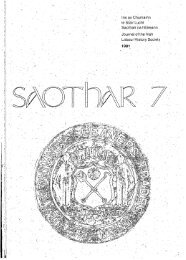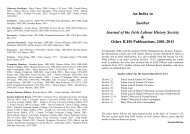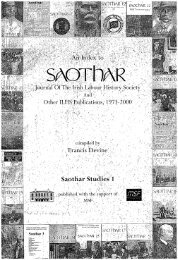76 SAOTHAR13only due to their activism but to the social utility of such views for a society undergoing rapidtransformation and in whiCh religious and ethnic loyalties were strong, at least in times of crisis. Beyondthat, evangelicalism was an important catalyst in the creation of a culture emphasising voluntaryorganisations, mutual and self-improvement, religion and respectability, and Protestant identity.Ironically, but for some of the same reasons, Irish Catholicism was steaming on the same course. Thus,the polarisation of rough and respectable cultures is common to both Protestant and Catholiccommunitiesbetween 1800 and 1850, the ramifications of which are discernible in the broader political,economic and social history of the period.Evangelical Protestantism did not, of course, have to be politicised, but its strong Englishconnections dating from the mid-eighteenth century, overt anti-Catholicism and stereotyped view ofitself and Irish Catholics made it a useful sentiment to exploit in times of economic or constitutionalcompetition. What we still need to know is what exactly are the dimensions of this movement, whatprecise impact did it have on working people in town and countryside, in what ways was its socialessence distilled from its theological apparatus and how does it relate to issues of class consciousness,denominational loyalties, sectarian animosities and Ulster's social, economic and political distinctivenessfrom the rest of Ireland. Such a research agenda, as the preceding pages have indicated, is wellworth pursuing. Nineteenth-century Ulster Protestantism may not have played as creative a role in theformation of class consciousness and labour politics as did some elements within English nonconformityin the same period, but its influence over social mores was almost certainly even more pervasive.NotesDavid Hempton and Myrtle Hill1. Elie Halevy, A History of the English People in the Nineteenth Century, 4 Volumes, (London, 1949-51). Forrecent historiographical surveys see E.S. Itzkin, 'The Halevy Thesis - A Working Hypothesis?' in ChurchHistory, 44, no. 1 (1975), pp. 47-56; A.D. Gilbert, 'Methodism, Dissent and Political Stability in earlyIndustrial England' in Journal of Religious History, 10, (1978-9), pp. 381-99; and David Hempton,'Evangelical Revival and Society: A Historiographical Review of Methodism and British Society c. 1750-1850' in Themelios, 8, no. 3, (April 1983), pp. 19-25.2. E.J. Hobsbawm, Primitive Rebels, (Manchester, 1959); Labouring Men: Studies in the History of Labour,(London, 1964); and E.P. Thompson, The Making of the English Working Class, (London, 1963).3. John Foster, Class Struggle and the Industrial Revolution: Early Industrial Capitalism in Three EnglishTowns, (London, 1974); and Patrick Joyce, Work, Society and Politics: the Culture of the Factory in laterVictorian England, (Brighton, 1980).4. HughMcLeod, 'Recent Studies in Victorian Religious History' in Victorian Studies, 21, no. 2 (1978), pp. 245-55; and his Religion and the Working Class in Nineteenth Century Britain, (London, 1984).5. Hugh McLeod, 'New Perspectives on Working Class Religion: The Oral Evidence' in Oral History, 14, no.1 (1986), pp. 31-49; John Rule, 'Methodism, Popular Beliefs and Village Culture in Cornwall 1800-50' inR.D.Storch (ed.), Popular Culture and Custom in Nineteenth Century England, (London, 1982), pp. 48-70; and E.and S. Yeo (ed.), Popular Culture and Class Conflict, 1590-1914, (Brighton, 1982).6. A.R. Acheson, 'The Evangelicals in the Church of Ireland, 1784-1859', Queen's University Belfast PhD thesis(1967); A.T.Q. Stewart, 'The Transformation of Presbyterian Radicalism in the North of Ireland, 1792-1825',Queen's University Belfast MA thesis (1956); Peter Brooke, 'Controversies in Ulster Presbyterianism, 1790-1836', University of Cambridge PhD thesis (1980); and R.F.G. Holmes, Henry Cooke, (Belfast, 1981).7. Desmond Bowen, The Protestant Crusade in Ireland, 1800-70, (Dublin, 1978); I.M. Hehir, 'New Lights andOld Enemies: The Second Reformation and the Catholics of Ireland, 1800-1835', University of Wisconsin MAthesis (1983); and David Hempton, 'The Methodist Crusade in Ireland, 1795-1845' in Irish l/ istorical Studies,22, no. 85 (March, 1980), pp. 33-48 ..8. For a survey of recent work see Myrtle Hill, 'Evangelicalism and the Churches in Ulster Society, 1770-1850',Queen's University Belfast PhD thesis (1987); Joe Liechty has recently completed a PhD thesis on Dublinevangelicalism in Maynooth College, and Terence Duffy is engaged on a PhD thesis in Nuffield College,Oxford on 'Religion and Community in Belfast and Londonderry, 1859-1923'.
ESSAYS 779. For comparisons see E.T. Davies, Religion in the Industrial Revolution in South Wales, (Cardiff, 1965); E.T.Davies,.A New History of Wales: Religion and Society in the Nineteenth Century, (Dyfed, 1981); and DavidLuker, 'Revivalism in Theory and Practice; the Case of Cornish Methodism' in Journal of EcclesiasticalHistory, 37, no. 4, (October, 1986), pp. 603-19. . .. .10. For evangelical theology see Roger Anstey, The Atlantic· Slave Trade and BritishAbolition, 1760-1810,(London, 1975); for its organisational characateristics see F.K. Brown, Fathers of the Victorians, (Cambridge,1961); Ian Bradley, The Call to Seriousness, (London, '1976), and Myrtle Hill, op.cif ..11. For the importance of aristocratic leadership of the moral campaign, see F.K. Brown, op.cit., p. 3. See alsoV. Kiernan, 'Evangelicalism and the French Revolution' in Past and Present, no. I, (February, 1952), pp. 44-56.12. For the importance of the Irish evangelical aristocracy in English political life, seel.S. Rennie, 'Evangelicalismand English Public Life: 1823-1850', University of Toronto PhD thesis (1962); for the interconnectionsbetween Irish evangelicals see Myrtle Hill, op.cif., pp. 379-80.13. Correspondence of the Third Earl of Roden, (public Records Office of Northern Ireland, (PRONI), RodenPapers, Mic.147/5); Farnham Papers (National Library ofIreland, Ms. 18,608-18,630); C.E. Tonna, Lettersfrom Ireland, (London, 1837).14. A Statement of the Management of the Farnham Estates, (Dublin, 1830); J.R.R. Wright, 'An EvangelicalEstate, c. 1800-1825: The Influence on the Manchester Estate, County Armagh, with Particular Reference tothe Moral Agencies of W. Loftie and H. Porter', Ulster Polytechnic PhD thesis (1982); Hugh Kearney,'Evangelical Landlords in Nineteenth Century Ulster', UnpUblished Paper; Rev. C: White, Sixty YearsExperience as an Irish Landlord, (London, n.d.).15. A Statement r;fthe Management of the Famham Estates, (Dublin, 1830).16. C.S. Stanford, Memoir of the late Rev. WH.Krause, (Dublin, 1854); Krause was moral agent for LordFarnhamfrom 1826 to 1838; For some of the difficulties involved in appointing a suitable individual to this post, seethe correspondence between the Annesely and the Manchester estates, (PRONI, Annesely papers, DI854/6/14 March 1839).17. George Ensor, Letters Showing theJnutility and Showing the Absurdity of what is Rather Fantastically Termed'The New Reformation', (Dublin, 1828); The Substance of a Speech delivered by the Right Hon. LordFamham, at a Meeting held in Cavan on Friday 20 January 1828, for the Purpose of Promoting theReformation in Ireland, (Dublin, 1827); J. Madden, Famham Hall or The Second Reformation in Ireland, APoem, (Dublin, 1827); Second letter of Right Rev. J. M cH ale, Bishop of Moronia to Lord F arnham, (Dubln,n.d.); Anon, Specimens of the Conversions at Cavan by Bible Saints Submitted to the Common Sense of thePeople of England, (Dublin, 1827); Rev. T. Maguire, False Weights and Measures of Protestant Curate ofCavan ExiJ.mined and Exposed, (Dublin, 1833).18. On the Manchester estate, more tenants were dispossessed for offences against the landlord's moral code thanfor non-payment of rent, Wright, 'An evangelical estate', p. 213; see also Report of the commissionersappointed to enquire into the occupation of land in Ireland, 1845, Vol. XIX, p. 572, evidence of Captain Hill.Asked whether Lord Roden referred to political or religious distinctions in chosing his tenants or determiningtheir fate, Hill stated, 'we do not make any; but I would not say that as to moral distinctions. There are severalmen who have been put out in consequence of being very bad characters'.19. Report of the commissioners appointed to enquire into the occupation of land in Ireland, 1845, Vol. XIX, pp.18-19; J.S. Donnelly, Landlord and Tenant in Nineteenth Century Ireland, (Dublin, 1973), p. 22. -20. Helen Clayton, To School Without Shoes: A Brief History of the Sunday School Societyfor Ireland, 1809-1979,(Dublin, 1979).21. Sunday School Society for Ireland records 1809-1971, (Representative Church Body Library, Dublin, Ms.182).22. Hibemian Sunday School Society Report, 1831, (Dublin, 1831).23. Adam Averell to BFBS, 6 August, 1807, (British and Foreign Bible Society Records, Cambridge UniversityLibrary, Miscellaneous Book No. 2).24. Hibemian Sunday School Report, 1826, (Dublin, 1826); Hintsfor Conducting Sunday Schools; Useful alsofor Day Schools, and Families, compiled by the committee of the Sunday School Society for Ireland, 2ndedition, (Dublin, 1819).25. Quoted in Hibernian Sunday School Report, 1826, (Dublin, 1826).26. Helen Clayton, 'Societies Formed to Educate the Poor in Ireland in the late 18th Century and early 19thCentury', Trinity College Dublin MLitt, (1981).27. Hints for Conducting Sunday Schools, containing suggestions for rewards for Sunday school pupils. Lettersfrom teachers indicate that responses are largely dependent on local conditions; see letter from Lisburn, 3November, 1811; and from Castledawson, 14 February, 1811, Hibemian Sunday School Report, 1812,
- Page 1 and 2:
JOURNAL OF THE IRISH LABOUR HISTORY
- Page 3 and 4:
ContentsPageEditorial: Labour Histo
- Page 5 and 6:
EDITORIAL 3freedom to participate i
- Page 7 and 8:
CorrespondenceThe Irish Labour Part
- Page 9 and 10:
; ~ ; ,The Decline and Fall of Donn
- Page 11 and 12:
THE DECLINE AND FALL OF DONNYBROOK
- Page 13 and 14:
THE DECLINE AND FALL OF DONNYBROOK
- Page 15 and 16:
·' THE DECLINE AND FALL OF DONNYBR
- Page 17 and 18:
THE DECLINE AND FALL OF DONNYBROOK
- Page 19 and 20:
THE DECLINE AND FALL OF DONNYBROOK
- Page 21 and 22:
THE DECLINE AND FALL OF DONNYBROOK
- Page 23 and 24:
THE DECLINE AND FALL OF DONNYBROOK
- Page 25 and 26:
,'-,;-''''.A PASSAGE TO BRITAIN 23C
- Page 27 and 28: A PASSAGE TO BRITAIN 25only in the
- Page 29 and 30: A PASSAGE TO BRITAIN 27clothing._De
- Page 31 and 32: A PASSAGE TO BRITAIN 29established
- Page 33 and 34: ;:-.",.- .. .", ...... '.:. '
- Page 35 and 36: LOUIE BENNETI 33feminist movement w
- Page 37 and 38: :... ~: ."
- Page 39 and 40: -.- '.LOUlE BENNETT 37While there i
- Page 41 and 42: LOUIE ~ENNEIT 39Xl's encyclical Qua
- Page 43 and 44: LOUIE BENNEIT 41Bennett's own relat
- Page 45 and 46: LODIE BENNETT 43109; IWWU resolutio
- Page 47 and 48: Essays in ReviewCosherers, Wanderer
- Page 49 and 50: ••• .".'. >. '~"ESSA YS IN RE
- Page 51 and 52: ESSAYS IN REVIEW 49ConnolIy:Myth an
- Page 53 and 54: ESSAYS IN ~EVIEW 51tion' in the Int
- Page 55 and 56: ESSAYS IN REVIEW53International:'I
- Page 57 and 58: REVIEWScontroversy is real history.
- Page 59 and 60: REVIEWSJoe Monks was among the earl
- Page 61 and 62: REVIEWSnolly-Column Song','Proudly
- Page 63 and 64: REVIEWSresulting from the arrival o
- Page 65 and 66: REVIEWS,63the book by means of an a
- Page 67 and 68: REVIEWSlogue, it is hardly surprisi
- Page 69 and 70: The Team For All Workers ...CULIAIB
- Page 71 and 72: ESSAYS 69mission and moral refonn.l
- Page 73 and 74: .. ...... ~.~ -~ .'- '.ESSAYS. 71fr
- Page 75 and 76: ESSAYS 73claimed authority but whic
- Page 77: ESSAYS 75provided the basis for soc
- Page 81 and 82: ESSAYS 7952. Annals of Christ Churc
- Page 83 and 84: ESSAYS' 81Fianna Fail and the Worki
- Page 85 and 86: ESSAYS 83Eireann in 1925 visibly di
- Page 87 and 88: ESSAYS 85recognition of the impract
- Page 89 and 90: ESSAYS 871970, it created the condi
- Page 91 and 92: ESSAYS89The Irish Immigrants' Contr
- Page 93 and 94: ESSAYS" 91Although anti -Catholic p
- Page 95 and 96: ESSAYS 93McCowie played a key role
- Page 97 and 98: :. -,,'.' ',. .~.,:.ESSAYS 95Althou
- Page 99 and 100: ESSAYS 97young girl of their own ba
- Page 101 and 102: SourcesIrish Labour History Society
- Page 103 and 104: SOURCES 101INovember, 1971 to no. 1
- Page 105 and 106: SOURCES 103would claim credit for t
- Page 107 and 108: SOURCES105Sources for Irish Labour
- Page 109 and 110: SOURCES 107NorthWest Archives and L
- Page 111 and 112: SOURCES 109In 1966 the Finnish gove
- Page 113 and 114: TURNINGANEWLEAFThe CPSSUis the larg
- Page 115 and 116: REMINISCENCE 113us due to my politi
- Page 117 and 118: REMINISCENCE 115when Jim was presen
- Page 119 and 120: REMINISCENCE 117of Dail Eireann. 17
- Page 121 and 122: REMINISCENCE 119NotesThe above arti
- Page 123 and 124: DOCUMENT STUDY 121James Connolly in
- Page 125 and 126: DOCUMENT STUDY123SOCIAL DEMOCRATIC
- Page 127 and 128: DOCUMENT STUDY 125proletariat of th
- Page 129 and 130:
DOCUMENT STUDY 127the support of Je
- Page 131 and 132:
DOCUMENT STUDY 12926. The Workers'
- Page 133 and 134:
131BibliographyA Bibliography of Ir
- Page 135 and 136:
BIBLIOGRAPHY 133Compton, P.A. Demog
- Page 137 and 138:
BIBLIOGRAPHY 135Levine, I. and Madd
- Page 139 and 140:
BIBLIOGRAPHY 137Turner, M. 'Towards
- Page 141 and 142:
BIBLIOGRAPHY 1394. Land and Agricul
- Page 143 and 144:
BIBLIOGRAPHY 141Clogher Record12 (2
- Page 145 and 146:
BIBLIOGRAPHY 143Political Research
- Page 147 and 148:
BIBLIOGRAPHY 145Pres, 1987.O'Brien,
- Page 149 and 150:
147Notes on Contributorsf onathanBe
- Page 151 and 152:
1901: Ireland's first general union
- Page 153 and 154:
ELECTRICAL TRADES UNION .Establishe





